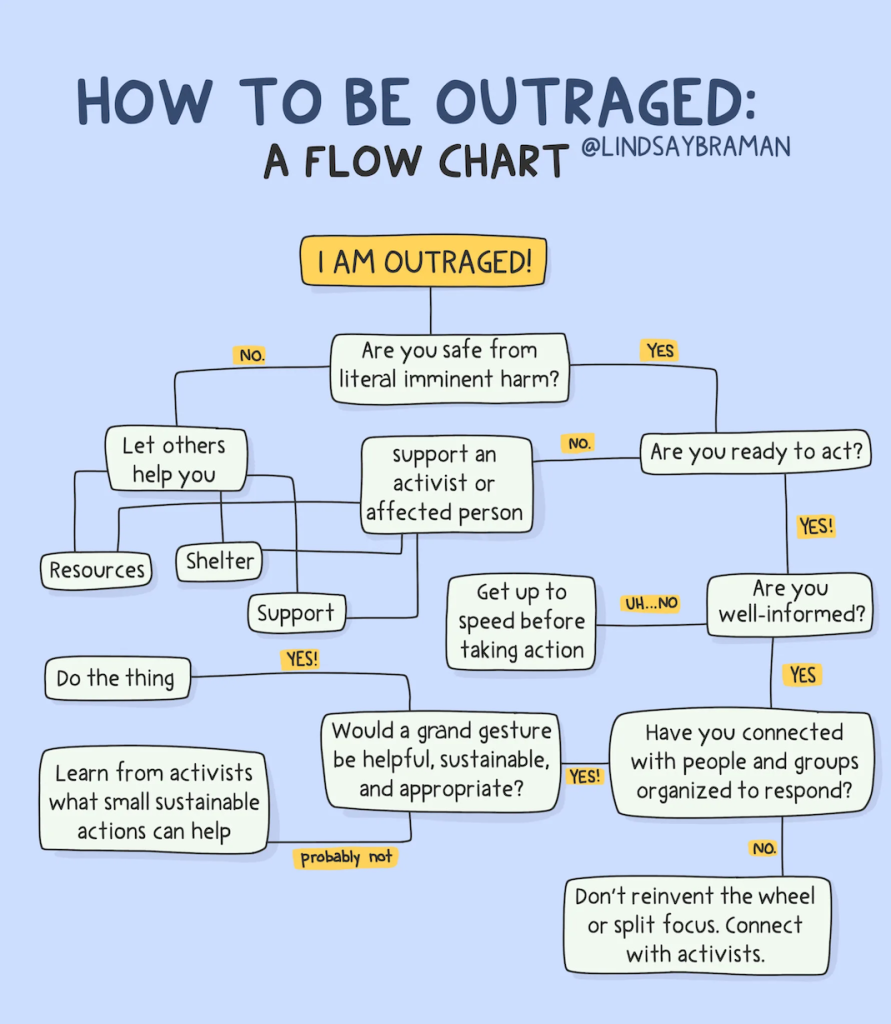How to Be Outraged: A Flowchart for Sustainable Social Activism [downloadable]
 When news breaks about troubling injustices, oppressive shifts in government, or court rulings that seem unthinkable, it’s normal to feel extremely angry. Anger, like no other emotion, can move us toward action.
When news breaks about troubling injustices, oppressive shifts in government, or court rulings that seem unthinkable, it’s normal to feel extremely angry. Anger, like no other emotion, can move us toward action.
For many, activism is a healthy way to process anger into work that actually helps to dismantle the roots of the problem, but figuring out how to help can be a challenge.
To help us navigate these stormy waters, therapist Lindsay Braman made a flow chart showing the steps to transforming anger into sustainable activism that effectively demands change.

Infographic republished with permission.
A Guide to this Flowchart for Sustainable Activism
Sometimes, we experience outrage in response to a court decision, news article, or political event. It’s normal and healthy to feel incredibly angry when events occur that we believe harm us or people we care about.
When we feel this kind of outrage, it’s essential to stop and check in with ourselves.
Are we safe? Are others safe?
Think Before Acting
If you are safe from imminent harm, pause and consider if you are ready to act. Before jumping into social activism, it’s essential that we understand the core issue and the underlying issues around it.
We must understand an issue to avoid jumping to conclusions and advocating for the wrong thing. Checking trustworthy sources and cross-checking with sources outside our typical media bubble can be a good way to ensure that we don’t prematurely jump to conclusions.
Connect with Existing Resources
If you are safe, ready to act, and well-informed about an issue, you are well on your way to being prepared to step into active action to move your outrage into activism. Whatever you are passionate about or have become recently impassioned about, there is probably an organization in your region.
Before planning a march, creating an event or rally, or staging a protest, talk with local organizers. Effective, sustainable activism requires that we connect with each other and allow the efforts of one to be supplemented by another.
Self-Examine for Motives Prompting the Need to Act
For meaningful change to occur, it’s important that we grow self-awareness and choose to be mindful of our motives as we engage in social justice-oriented activities.
Local activists can help us learn what the appropriate course of action is. Although anger and outrage often move us towards activism, we should be mindful not to engage in activism for the sake of soothing our anger.
Find ways to meaningfully engage with activist communities over longer periods of time. Channel your outrage into small doses of sustainable activism – lending time, money, or your skills to the cause in the weeks, months, and years to come.
Anger, like no other emotion, has the power to move us toward action. That can be a powerful thing, but when we act impulsively or without informing ourselves, we can actually undermine the work of activists.
Anger at governments, social systems, or political powers can be difficult to handle. Unlike anger with a specific person, outrage at social injustice or political inequality can be more complex to navigate.
Excerpted from “How to Be Outraged: A Flowchart for Sustainable Social Activism” by . Read the full post on her website, where you may also purchase a downloadable PDF of the flowchart for personal use or get a copy free of charge with a subscription to her newsletter.
Source: Lindsay Braman | How to Be Outraged: A Flowchart for Sustainable Social Activism, https://lindsaybraman.com/anger-to-activism-flowchart | © 2022 Lindsay Braman. Infographic republished with permission. Content is for educational purposes only.
Do you need someone to talk to? To schedule a free 30-minute Care Consultation or to get advice about your child’s or teen’s challenges, call or email a CHC Care Coordinator at 650.688.3625 or careteam@testing.chconline.org CHC teletherapy services are available now.






